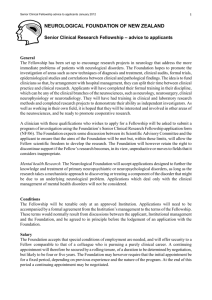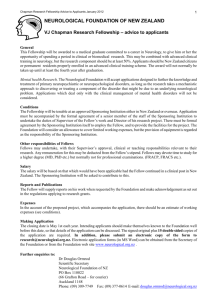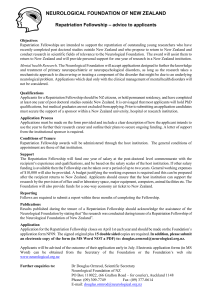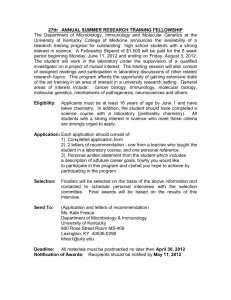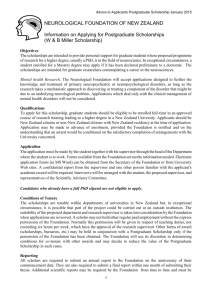Philip Wrightson Postdoctoral Fellowship – advice to applicants
advertisement
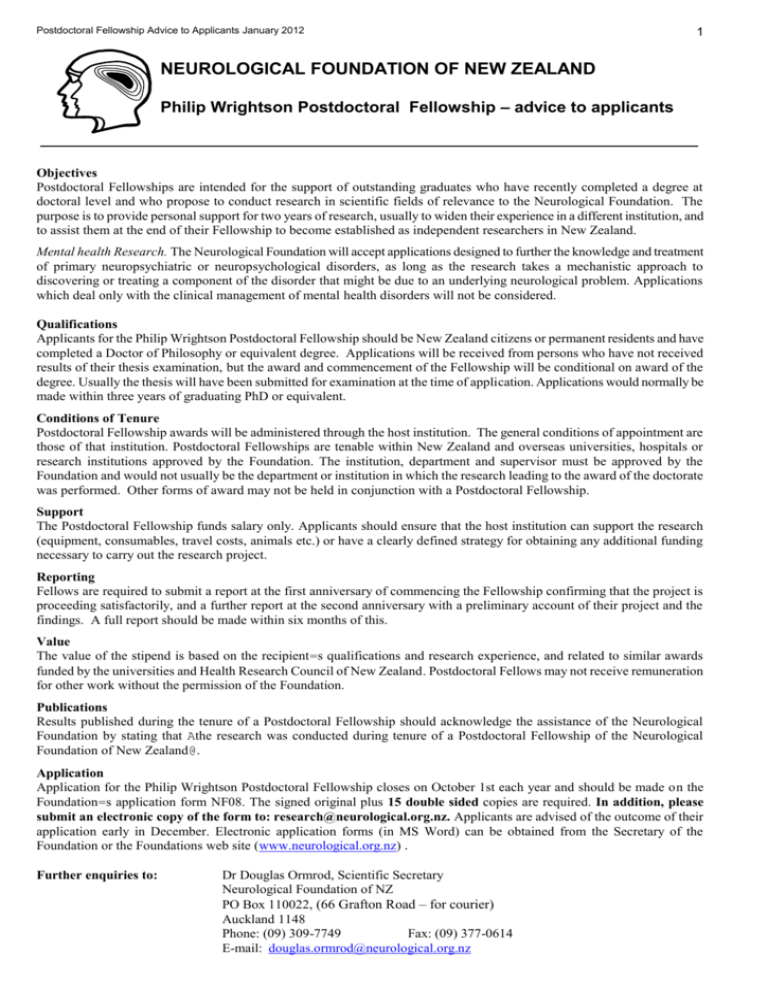
Postdoctoral Fellowship Advice to Applicants January 2012 1 NEUROLOGICAL FOUNDATION OF NEW ZEALAND Philip Wrightson Postdoctoral Fellowship – advice to applicants Objectives Postdoctoral Fellowships are intended for the support of outstanding graduates who have recently completed a degree at doctoral level and who propose to conduct research in scientific fields of relevance to the Neurological Foundation. The purpose is to provide personal support for two years of research, usually to widen their experience in a different institution, and to assist them at the end of their Fellowship to become established as independent researchers in New Zealand. Mental health Research. The Neurological Foundation will accept applications designed to further the knowledge and treatment of primary neuropsychiatric or neuropsychological disorders, as long as the research takes a mechanistic approach to discovering or treating a component of the disorder that might be due to an underlying neurological problem. Applications which deal only with the clinical management of mental health disorders will not be considered. Qualifications Applicants for the Philip Wrightson Postdoctoral Fellowship should be New Zealand citizens or permanent residents and have completed a Doctor of Philosophy or equivalent degree. Applications will be received from persons who have not received results of their thesis examination, but the award and commencement of the Fellowship will be conditional on award of the degree. Usually the thesis will have been submitted for examination at the time of application. Applications would normally be made within three years of graduating PhD or equivalent. Conditions of Tenure Postdoctoral Fellowship awards will be administered through the host institution. The general conditions of appointment are those of that institution. Postdoctoral Fellowships are tenable within New Zealand and overseas universities, hospitals or research institutions approved by the Foundation. The institution, department and supervisor must be approved by the Foundation and would not usually be the department or institution in which the research leading to the award of the doctorate was performed. Other forms of award may not be held in conjunction with a Postdoctoral Fellowship. Support The Postdoctoral Fellowship funds salary only. Applicants should ensure that the host institution can support the research (equipment, consumables, travel costs, animals etc.) or have a clearly defined strategy for obtaining any additional funding necessary to carry out the research project. Reporting Fellows are required to submit a report at the first anniversary of commencing the Fellowship confirming that the project is proceeding satisfactorily, and a further report at the second anniversary with a preliminary account of their project and the findings. A full report should be made within six months of this. Value The value of the stipend is based on the recipient=s qualifications and research experience, and related to similar awards funded by the universities and Health Research Council of New Zealand. Postdoctoral Fellows may not receive remuneration for other work without the permission of the Foundation. Publications Results published during the tenure of a Postdoctoral Fellowship should acknowledge the assistance of the Neurological Foundation by stating that Athe research was conducted during tenure of a Postdoctoral Fellowship of the Neurological Foundation of New Zealand@. Application Application for the Philip Wrightson Postdoctoral Fellowship closes on October 1st each year and should be made on the Foundation=s application form NF08. The signed original plus 15 double sided copies are required. In addition, please submit an electronic copy of the form to: research@neurological.org.nz. Applicants are advised of the outcome of their application early in December. Electronic application forms (in MS Word) can be obtained from the Secretary of the Foundation or the Foundations web site (www.neurological.org.nz) . Further enquiries to: Dr Douglas Ormrod, Scientific Secretary Neurological Foundation of NZ PO Box 110022, (66 Grafton Road – for courier) Auckland 1148 Phone: (09) 309-7749 Fax: (09) 377-0614 E-mail: douglas.ormrod@neurological.org.nz Postdoctoral Fellowship Advice to Applicants January 2012 2 APPENDIX: FIELDS OF RESEARCH – NEUROLOGICAL FOUNDATION OF NEW ZEALAND Addiction: alcohol Addiction: other Addiction: tobacco Affective disorders Ageing AIDS: behaviour AIDS: clinical Alcohol/drug dependence Alcohol: clinical Alzheimer's disease Anaesthesia and pain management Anatomy and histology Anatomy: general Anatomy: histochemical Anatomy: ultrastructure Autonomic nervous system Behavioural science Biochemistry Biological rhythms: sleep Biology: membrane Biology: molecular Biostatistics Brain stem Cancer: chemotherapy Cancer: clinical trials Cancer: epidemiology Cardiovascular: regulation Child health Clinical trials Community care Community health Community health: risk reduction Community health: screening Computer modelling Computing Congenital abnormalities Dentistry Depression Dermatology Diet Disability Down's syndrome Drug design/development Drug interactions Drugs Drugs of abuse Drugs of dependence Drugs: mode of action Ear disease Endocrinology: neuroendocrinology Endocrinology: pituitary Environmental health Environmental toxicology Epidemiology Epilepsy Ethics Genetic diseases Genetics: gene expression Genetics: gene mapping Genetics: gene targeting Genetics: gene therapy Genetics: general Handicapped persons Health care evaluation Health economics Health planning Health policy Health services research Health: education Health: promotion Health: protection Hearing Huntington's Chorea Hyperactivity Imaging Immunochemistry Immunogenetics Immunology: autoimmunity Immunology: basic Immunology: cellular Immunology: clinical Immunology: cytokines and growth factors Immunology: general Immunology: inflammatory processes Immunology: molecular biology Immunology: therapy Immunopathology Immunotoxins Infectious diseases Inflammation Injury: prevention Injury: unintentional Intensive care Kinesiology Language Learning Maori health Mathematical modelling Medical physics Medicine: general Memory Mental health: illness Mental health: services Mental health: wellbeing Metabolic disease Microbiology Mol & cell biology Mol & cell biology: apoptosis Mol & cell biology: cell activation Mol & cell biology: cell adhesion Mol & cell biology: cell cycle Mol & cell biology: cell proliferation Mol & cell biology: developmental Mol & cell biology: differentiation Mol & cell biology: hormones & growth factors Mol & cell biology: membranes Mol & cell biology: mitosis Mol & cell biology: necrosis Mol & cell biology: receptors Mol & cell biology: signal transduction Mol & cell biology: tumour Morphology Movement Multiple sclerosis Muscular dystrophy Neural plasticity Neuroanatomy Neurobiology Neurochemistry Neurology Neurology: autonomic Neurology: central Neurology: general Neurology: peripheral Neuromuscular disease Neuropathology Neuropeptides Neuropharmacology Neurophysiology: basic Neurophysiology: clinical Neuropsychology Neuroscience Neurosurgery Neurotoxicity Neurotransmitters/neuromodul ators NMR: radiology Nursing: clinical Nursing: community Occupational health Occupational health: injury prevention Occupational health: risk reduction Occupational health: screening Oncology and carcinogenesis Ophthalmology Optometry Pacific Islander's health Paediatrics Paediatrics: adolescent Paediatrics: behavioural Paediatrics: development Paediatrics: general Pain Parasitology Parkinson's disease Pathology Pathology: anatomic Pathology: experimental Postdoctoral Fellowship Advice to Applicants January 2012 Pathology: general Pathology: histochemistry and cytology Pathology: histopathology and EM Pathology: immunopathology Pathology: molecular Pathology: neuropathology Pharmacology Pharmacology: autonomic Pharmacology: clinical Pharmacology: experimental Pharmacology: general Pharmacology: molecular Pharmacology: receptors Pharmacology: toxicology Physical education Physiology Physiology: auditory Physiology: brain Physiology: cardiovascular Physiology: cellular/molecular Physiology: corneal Physiology: developmental Physiology: ear Physiology: general Physiology: ion exchange/transport Physiology: muscle Physiology: sensory Physiology: smooth muscle Physiotherapy Poisons and chemicals Prescribing Preventive medicine Primary health care Psychiatry Psychiatry: adolescent Psychiatry: adult Psychiatry: autism Psychiatry: child Psychiatry: epidemiology Psychiatry: forensic Psychiatry: general Psychiatry: liaison Psychiatry: psychosomatic Psychiatry: psychosomatics Psychiatry: psychotherapy Psychiatry: social Psychology: adolescent Psychology: adult Psychology: basic Psychology: behaviour analysis Psychology: child Psychology: clinical Psychology: community Psychology: development Psychology: forensic Psychology: psychometrics Psychology: social Psychopathology Psychopharmacology Psychotherapy Public health Quality of life Rehabilitation medicine Reproduction Schizophrenia Serotonin Sexuality Sleep Social work Speech Spina Bifida Spinal cord Sports medicine Sudden Infant Death Syndrome Suicide Surgery Surgery: clinical Surgery: experimental Survey methodology Tissue culture: embryonic stem cells Tissue culture: mammalian cells Tissue culture: organs Toxicology Trauma Vision Weight disorders 3

